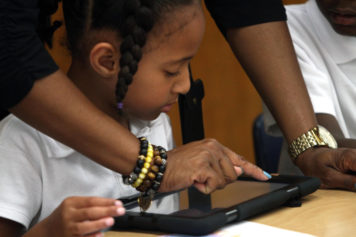Detroit, like many other large urban centers across the country, certainly has its share of low-income and underserved communities. And like its big-city peers, there exist numerous pockets of Detroit largely populated by African-Americans and Latinos that don’t benefit from the public and private services other communities take for granted. For many of these underserved urban residents, the Federal Communications Commission (FCC) announcement of its plans to end net neutrality — current regulations ensuring equal access within the internet experience — means little since they commonly lack access to the internet itself.
Fortunately, a number of African-Americans and Latinos in Detroit have been doing something about this. For over a year, a community-based nonprofit known as the Detroit Community Technology Project (DCTP) has conducted an Equitable Internet Initiative (EII) that constructs local wireless networks to provide affordable high-speed internet to Detroit’s underserved communities. The group, which works to expand digital knowledge and technological access in communities, is rallying back against the creation of a digital class system where reliable internet access is based on income, geography and race.
While this larger goal is both noble and lofty, some got involved for more specific reasons. “Every computer in the church was being used by our young people on that Sunday prior to returning to school Monday at the end of Christmas break,” remembered Wallace Gilbert, a technologist, DCTP member and assistant pastor at Church of the Messiah, referring to a scenario in January 2016. Among its many nonprofit offerings, his 142-year-old church in Detroit’s lower eastside houses a youth center with a bike shop, silkscreen lab, leather crafting unit, media company, business incubator, employment center and computer lab. “I asked one of the young men, who I had personally helped to build his own computer, ‘why are you still here working on your homework? Didn’t we build you a machine?”
The young man, recalled Gilbert, said “Yeah, we did, but I don’t have the internet at home.” So, that’s when “it dawned on me, we’re providing computers to the community but, without the internet, we’re doing no more than giving them typewriters.” The realization prompted Gilbert to get involved in the budding EII project, now hosted in the church, and lend his much-needed technological expertise and oversight.
In Detroit, Gilbert’s young computer student is far from alone. With close to 700,000 residents, the city has one of the worst rates of internet access of any major American city with over 38 percent of its residents lacking broadband at home, a rate jumping to a startling 63 percent for low-income households. Accordingly, EII’s goals are threefold, namely to increase online access through the distribution of shared internet connections to several underserved Detroit neighborhoods, to train Digital Stewards from those same neighborhoods with the skills to bring their communities online, and to increase opportunities in innovation for Detroit youth through digital literacy trainings. The targeted communities include Detroit’s Southeast, Southwest and North End neighborhoods based on their socioeconomic profiles and their proximity to existing digital infrastructure.
“We’ve got people employed and training, the instructors are earning income, the young people are earning laptops and learning to write code,” said Gilbert. “And once they successfully complete the program, even if we can’t hire them all, we’re going to hire a number of them,” noting that “it’s a blessing to the community.”
Here’s how it works. Many telecom companies won’t offer services within impoverished urban areas mostly because these major providers anticipate a relative lack of revenue. So EII steps in and constructs a mesh wireless technology with a system of interconnected wireless routers enabling residents without internet services to form their own local network with a shared internet connection. Given DCTP had already been training Digital Stewards in numerous Detroit communities since 2012, these local technology leaders are now equipped to construct and manage their own wireless communications infrastructure, or “mesh networks.” They identify and build upon already-existing digital and social resources within neighborhoods such as local businesses, churches, computer centers and community organizing hubs to encourage and sustain these networks. The program has trained more than 25 neighborhood leaders in Detroit, and its efforts include the ongoing maintenance of the cassco.co mesh network in Detroit’s Cass Corridor.
Mesh networks, which are increasing in popularity across the country, have already played important roles in everything from daily internet access to disaster relief. “In 2011, well before (Hurricane) Sandy hit New York, a local youth-development nonprofit called Red Hook Initiative set up a local mesh network called Red Hook WiFi,” recently wrote technology analyst Ingrid Burrington for NYMag.com. “After Sandy, it quickly became a crucial communications resource, and, after the installation of a satellite uplink” it became a “tool for distributing free internet access in the neighborhood.”
The implications of this locally-controlled technology, especially given the looming loss of net neutrality, are compelling.
“Rather than putting such a core tenet of the internet in the hands of politicians, whose whims and interests change with their donors, net neutrality must be protected by a populist revolution in the ownership of internet infrastructure and networks,” recently wrote Vice’s Jason Koebler. “In short, we must end our reliance on big telecom monopolies and build decentralized, affordable, locally owned internet infrastructure. The great news is this is currently possible in most parts of the United States.”
Not only is it possible, as the Detroit model attests, it is already happening in numerous local communities across the country. Cities are rejecting major telecom companies in favor of establishing their own locally-run internet service providers, rural towns are using natural resources like mountains and tall trees to erect wireless internet antennas, and some communities are even using television spectrum to broadcast internet wirelessly.
While Gilbert certainly sees value in the role such local networks play in combatting the Digital Divide and the loss of net neutrality, the pastor is more invested in what they enable, rather than fight against.
“The most powerful part of the tool is the community organizing,” stressed Gilbert, noting how the local networks being built in a number of the city’s underserved communities will ultimately join to form an intranet as well. In doing so, these varied communities and local partners — already including a lengthy list of local businesses, nonprofits, churches of various denomination, and community groups — have to communicate, organize, train and build together while sharing knowledge, culture and technology. “It’s almost like we are ahead of the curve,” said Gilbert, looking beyond the politics of net neutrality. “They may be able to control what information is on the internet, but they have no control over something that you personally and locally own, so they won’t have the ability to shut down our intranet.”
“Even if they were to disconnect us from the internet, because we have so many wonderful partners — and if all of us were to contribute the plethora of information that we have — it would continue to make our community self-sustainable,” said Gilbert, adding “at the end of the day, that is our ultimate goal.”

